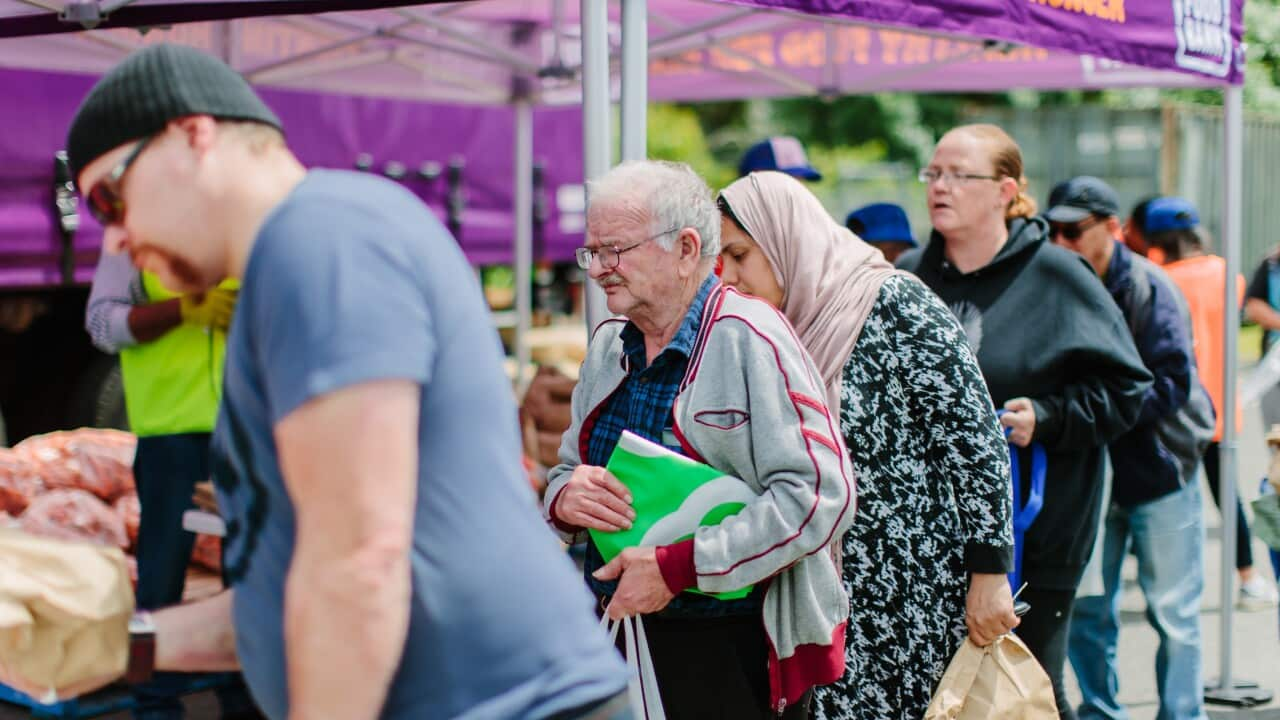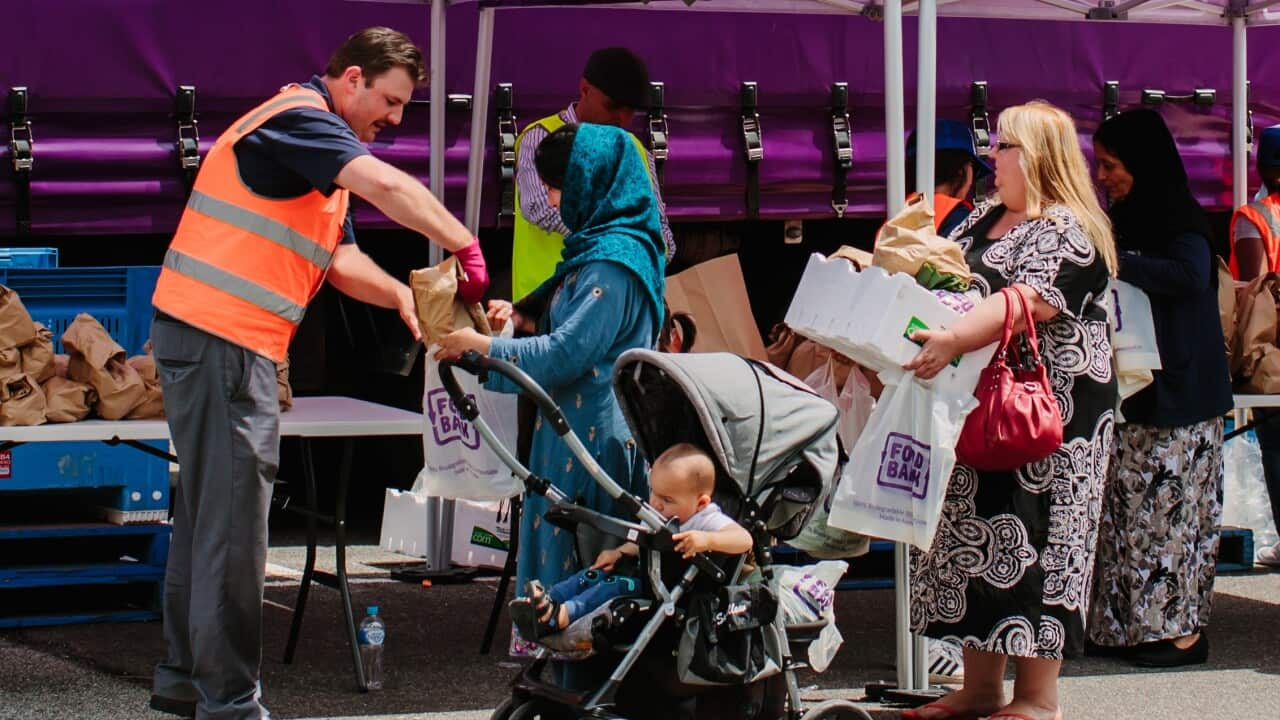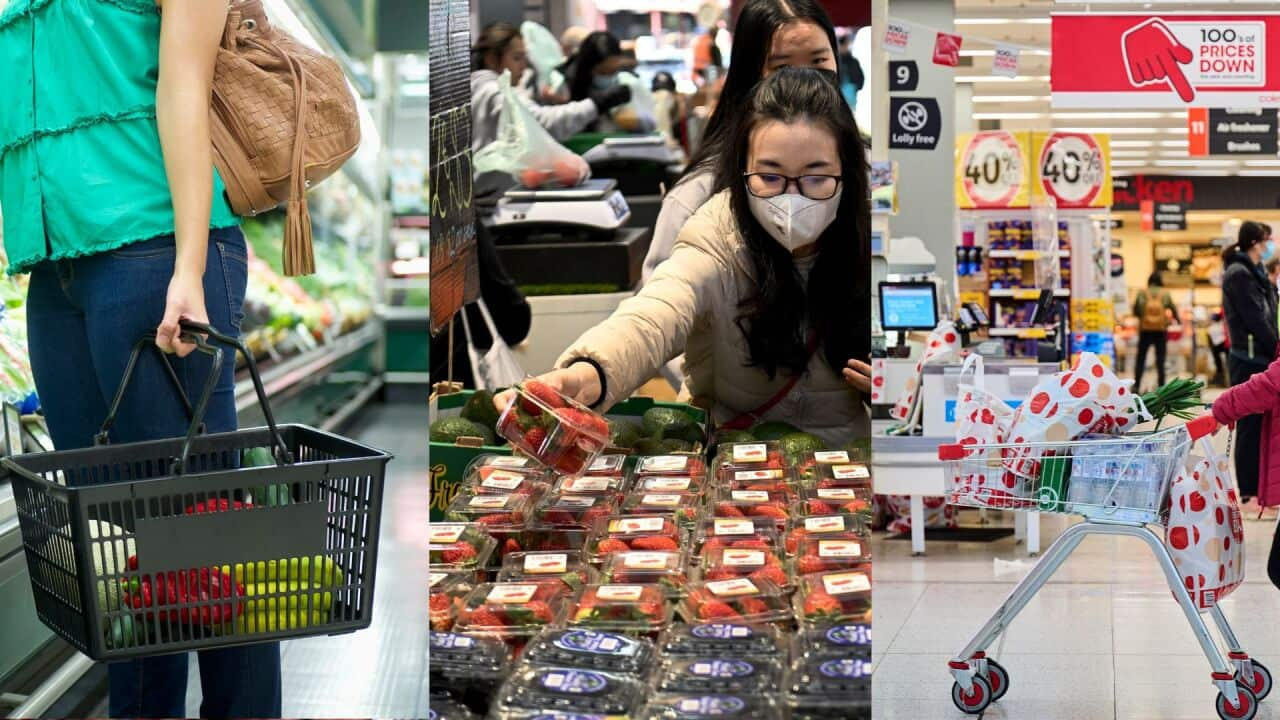Key Points
- When Rebecca was $35 short of being able to pay for basic groceries, a kind stranger offered to cover the shortfall.
- As the cost of living continues to rise, the single mother-of-two has been struggling to make ends meet for months.
- Charities are under increasing pressure with the cost of goods rising and a growing number of people needing support
Rebecca Moore was at her local Woolworths on Sunday when she realised she didn’t have in her trolley.
“I took out some toilet paper, some cereal, and a couple of other things,” the Corowa-based single mother of two told SBS News.
The woman next to her in the queue noticed what she was doing and offered to help her out.
“She wanted to pay for the lot, and I said, ‘I can't let you pay for the lot, but if you could please help me with the $35 that I'm short, that would be absolutely amazing’, and she did,” the 51-year-old said.
“I couldn't believe it. I was so incredibly blown away by this lady's beautiful random act of kindness.
“I was crying, and the lady behind the register, she was crying.”
“It was just such a beautiful thing … to have someone do that for me.”
Ms Moore said she’d been struggling to make ends meet for months, but this was the first time she’d gotten to the supermarket checkout and not been able to pay for everything.
“My fridge used to be full of groceries, and now when the kids aren't here, I'm not exaggerating, I'm having rice crackers for lunch and dinner sometimes,” she said.
“I work, and I do the best I can, and I still am having a hard time in getting all of this together at the moment.
According to a new survey from the Smith Family, rising costs of living can also add to the educational challenges already faced by children experiencing disadvantage.
The report found 62 per cent of parents and carers have found it harder to afford all the things their children need for school this year, and 38.1 per cent said school has been hard or very hard for their children this year.
Ms Moore said she tries to shield her children from financial struggles.
"I don't let on to them at all that we're struggling ... they're only 11 and 14, they're only young," she said.
"Thank God they weren't there with me at the register because that would have been even worse ... I didn't want them to see that. They don't know."
Ms Moore has also postponed family holidays, organised for her children to catch the bus instead of being driven to school, and sought additional support from Centrelink to try and support her family.
“The cost of living is just out of control, it's crazy,” she said.
“We were once considered the lucky country, and at the moment, I just don't think that that's really happening, you know, the interest rates just keep going up and up and up.”
Charities under increased pressure
Hunger relief charity Foodbank Australia said the increase in the number of people needing its support, combined with the rising cost of goods, is impacting the amount and type of help it can give.
“We simply don't have enough of the right food to be able to meet that demand,” Foodbank CEO Brianna Casey told SBS News.
“So, for example, we're having to place limits on the amount of fresh fruit and vegetables that some people are able to take from Foodbank, not because we don't want to be able to provide more, but we need to make sure that everyone gets at least a little.
“We don't ever want to be in a position where we turn someone away or have some sort of waiting list. We want to make sure that everyone who needs assistance can receive it.”
Other charities that provide food relief have reported they’ve been due to the rising cost of living, as well.
Where do the major supermarkets stand on helping struggling customers?
SBS News reached out to major supermarkets to find out whether they have policies for situations where people don’t have enough money to cover their full grocery bill and if there is ever room for discretion in letting part or all of a customer’s bill slide.
Coles said it does not have a policy around supporting customers who cannot pay for their groceries, but it is at customers' discretion how they would like to support others.
“We love to hear stories about our customers and team members going above and beyond to make life easier for those shopping in our stores," a spokesperson said.
"You never know what is happening in someone else’s life, and moments of kindness such as this remind us how a simple gesture can really make a difference.”
Woolworths said it was aware of this happening from time to time and instances of the same thing occurring with other retailers.
What can you do to help?
For those who are in a position to provide financial assistance, Foodbank states that for every $1 donated to the charity, it can provide two meals for someone in need.
A one-off $35 donation can help to provide struggling families with essential pantry staples, $60 can help to pay for fresh ingredients, and $120 can help to fill up the buses and trucks that take supplies directly to communities in need with a range of items from all food groups.
There are countless other charities, community pantries, and mutual aid groups operating around the country that also provide food relief to those in need, including Vinnies, the Asylum Seeker Resource Centre, and Sikh Volunteers Australia.
Ms Moore encouraged anyone who is in a financial position to help out to do so, either by paying it forward or by donating to a charity.
“It means so much, you have no idea how much that helps someone, and it's just made such a difference [to me],” she said.
For those who want to help out but can’t afford to donate money, there is the option of volunteering for a charity or local group.
What can you do if you're struggling?
In addition to lifestyle changes such as cancelling subscription services and driving less, Ms Moore has also tried to be proactive by locking in her home loan rate, speaking to her boss about a pay rise, and researching any discounts or support payments available.
"I really encourage people, go to Centrelink and find out if there's something that you're eligible for," she said.
"And with the gas and electricity company, I've been seeing (in the news) that there are discounts that are available to some people, so I've been sending that to friends as well to say, look, you may be eligible for some sort of discount."
Ms Casey said people who are struggling to feed their families often do not ask for help.
"We know the biggest reason that people aren't asking for help is because of shame and stigma and embarrassment, and the second highest reason is because they feel that someone else deserves this assistance more than they do," she said.
"We are here to tell those people; you deserve our help just as much as anyone else does.
"If you are struggling to feed yourself if you are struggling to feed your family ... please reach out, please ask for assistance, we want to be able to help."
Would you like to share your story with SBS News? Email [email protected]













